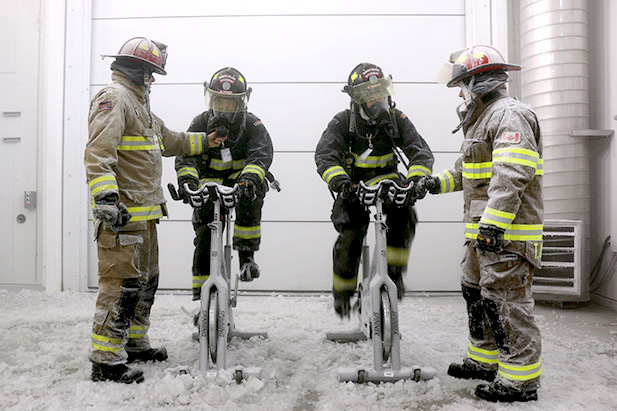Cutting-edge environmental first responder training in ACE climate chambers
ACE capable of simulating fire ground emergency scenarios
January 27, 2017

From the scorching heat of house fires to the blistering cold of a highway pileup in the dead of winter, firefighters can face the most extreme conditions any day on the job. This reality places great importance on firefighters’ ability to stay both cognitively and physically calm in the most challenging emergency scenarios.
At the University of Ontario Institute of Technology (UOIT), the ACE climate chambers provide an environment that ensures first responders can train in made-to-order extreme conditions, any day of the year.
ACE has initiated a Firefighting Environmental Stress Workshop, in partnership with the Kinesiology program in the university’s Faculty of Health Sciences and the Fitness and Health Promotion program at Durham College (DC). Capable of producing temperatures from minus-40 to plus-60 degrees Celsius, ACE delivers the most severe weather conditions to train firefighters and evaluate how their bodies react in these stressful environments.
The 2016 pilot course was completed by the firefighting students of DC’s Pre-Service Firefighter program. Students performed a scene arrival and forcible-entry simulation in slick freezing rain, a search-and-rescue in blistering heat, sub-zero physiological testing, as well as patient care in a moving ambulance. Students were pushed to their physiological and psychological boundaries to accurately replicate the physical and cognitive impact of high-stress rescue situations.
The ACE workshop allows firefighter trainees to put classroom theory into practice, and gives students the ability to visually track their physiological performance. The results help determine what students can do to improve and which techniques they can leverage to achieve optimal performance in adverse conditions. Students also develop stronger teamwork skills as they become more aware of the drastically different results in-class practice produces in comparison to real-life emergency situations.
In November 2016, ACE received $110,000 from the DC-UOIT Innovative Initiatives Fund to advance the ACE Centre for Firefighting Research and Education. Upgrades to the Environmental Stress Workshop are underway and Durham College Pre-Service Firefighter students will take part in their next workshop on Friday, April 7.
Quotes
“When firefighters are exposed to environmental stressors they experience an increase in cardiovascular, respiratory and thermoregulatory strain, in addition to elevated workloads and muscle fatigue. Through the simulated environment of the ACE climate chambers, we can make maximal heart rates achievable in even low-intensity situations.”
-Michael Williams-Bell, Professor, Durham College School of Health & Community Services
“The type of training our students received in the ACE climate chambers closely replicates real-world firefighting situations. This environment provides trainees with experiences and conditions that will prepare them for their future career as firefighters.”
-Rick Bowler, Lead Instructor, Durham College Pre-Service Firefighter program
ACE contact:
Colin Howard
Marketing Specialist and Account Manager, ACE
colin.howard@uoit.ca
289.688.0930



